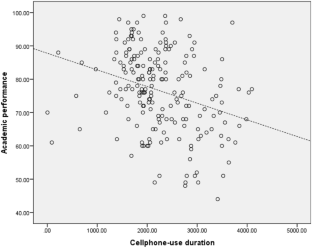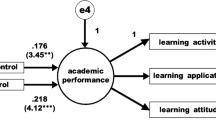Abstract
Cellphone-use in class has many negative effects on students' overall performance. By using a self-developed monitoring-app to record students' cellphone-use in class, this study attempts to explore the relationships of cellphone-use and self-control on academic performance. The subjects of this study are 207 freshmen who take part in advanced mathematics courses, and the research period lasts for 16 weeks. Two-factor ANOVA showed that cellphone-use duration and self-control had an interactive influence on students' academic performance. There was no statistical significance in the influence of cellphone-use frequency and self-control on academic performance. Simple slopes analysis revealed a negative relationship between cellphone-use duration and academic performance for those who were low on self-control, whereas there was no relationship between these constructs for those who were high on self-control. The results show that self-control plays a moderating role in the relationship between cellphone-use duration and academic performance. Self-control could weaken the influence of cellphone-use on academic performance. Furthermore, this study is helpful to better understand the way of cellphone-use affecting academic performance, and suggests appropriate intervention of cellphone-use to help poor self-controlled students achieve better academic performance.



Similar content being viewed by others
References
Aharony, N., & Zion, A. (2019). Effects of WhatsApp’s use on working memory performance among youth. Journal of Educational Computing Research, 57(1), 226–245. https://doi.org/10.1177/0735633117749431
Baert, S., Vujić, S., Amez, S., Claeskens, M., Daman, T., Maeckelberghe, A., Omey, E., & Marez, L. (2020). Smartphone use and academic performance: Correlation or causal relationship? Kyklos, 73(1), 22–46.
Barkley, J. E., & Lepp, A. (2016). Mobile phone use among college students is a sedentary leisure behavior which may interfere with exercise. Computers in Human Behavior, 56, 29–33. https://doi.org/10.1016/j.chb.2015.11.001
Baumeister, R. F., Vohs, K. D., & Tice, D. M. (2007). The strength model of self-control. Current Directions in Psychological Science, 16(6), 351–355. https://doi.org/10.1111/j.1467-8721.2007.00534.x
Beneito, P., & Vicente-Chirivella, Ó. (2020). Banning mobile phones at schools: Effects on bullying and academic performance. Discussion Papers in Economic Behaviour. Retrieved January 31, 2023, from https://www.erices.es/upload/workingpaper/99_99_0420.pdf
Berger, S., Wyss, A. M., & Knoch, D. (2018). Low self-control capacity is associated with immediate responses to smartphone signals. Computers in Human Behavior, 86, 45–51. https://doi.org/10.1016/j.chb.2018.04.031
Bjornsen, C. A., & Archer, K. J. (2015). Relations between college students’ cell phone use during class and grades. Scholarship of Teaching and Learning in Psychology, 1(4), 326–336. https://doi.org/10.1037/stl0000045
Carrillo, R., & Subrahmanyam, K. (2015). Mobile phone multitasking and learning. In I. G. I. Global (Ed.), Encyclopedia of mobile phone behavior (pp. 82–92)
Carver, C. S. (2019). Advanced social psychology: The state of the science. Oxford University Press.
Duckworth, A. L., & Seligman, M. E. P. (2006). Self-discipline gives girls the edge: Gender in self-discipline, grades, and achievement test scores. Journal of Educational Psychology, 98(1), 198–208.
Duckworth, A. L., Taxer, J. L., Eskreis-Winkler, L., Galla, B. M., & Gross, J. J. (2019). Self-control and academic achievement. Annual Review of Psychology, 70, 373–399.
Duncan, D. K., Hoekstra, A. R., & Wilcox, B. R. (2012). Digital devices, distraction, and student performance: Does in-class cell phone use reduce learning? Astronomy Education Review, 11(1), 1–4.
Ellis, D. A. (2019). Are smartphones really that bad? Improving the psychological measurement of technology-related behaviors. Computers in Human Behavior, 97(March), 60–66. https://doi.org/10.1016/j.chb.2019.03.006
Felisoni, D. D., & Godoi, A. S. (2018a). Cell phone usage and academic performance: An experiment. Computers and Education, 117(October 2017), 175–187. https://doi.org/10.1016/j.compedu.2017.10.006
Felisoni, D. D., & Godoi, A. S. (2018b). Cell phone usage and academic performance: An experiment. Computers & Education, 117(March 2017), 175–187. https://doi.org/10.1016/j.compedu.2017.10.006
Fried, C. B. (2008). In-class laptop use and its effects on student learning. Computers & Education, 50(3), 906–914.
George, M. J., Jensen, M. R., Russell, M. A., Gassman-Pines, A., Copeland, W. E., Hoyle, R. H., & Odgers, C. L. (2020). Young adolescents’ digital technology use, perceived impairments, and well-being in a representative sample. Journal of Pediatrics, 219, 180–187. https://doi.org/10.1016/j.jpeds.2019.12.002
Glass, A. L., & Kang, M. (2019). Dividing attention in the classroom reduces exam performance. Educational Psychology, 39(3), 395–408. https://doi.org/10.1080/01443410.2018.1489046
Hofmann, W., Baumeister, R. F., Förster, G., & Vohs, K. D. (2012). Everyday temptations: An experience sampling study of desire, conflict, and self-control. Journal of Personality and Social Psychology, 102(6), 1318–1335.
Honken, N., Ralston, P. A., & Tretter, T. R. (2016). Self-control and academic performance in engineering. American Journal of Engineering Education, 7(2), 47–58.
Junco, R. (2012). In-class multitasking and academic performance. Computers in Human Behavior, 28(6), 2236–2243. https://doi.org/10.1016/j.chb.2012.06.031
Kates, A. W., Wu, H., & Coryn, C. L. S. (2018). The effects of mobile phone use on academic performance: A meta-analysis. Computers and Education, 127(August), 107–112. https://doi.org/10.1016/j.compedu.2018.08.012
Kim, I., Kim, R., Kim, H., Kim, D., Han, K., Lee, P. H., Mark, G., & Lee, U. (2019). Understanding smartphone usage in college classrooms: A long-term measurement study. Computers and Education, 141(5), 103611. https://doi.org/10.1016/j.compedu.2019.103611
Kopecký, K., Fernández-martín, F. D., Szotkowski, R., Gómez-garcía, G., & Mikulcová, K. (2021). Behaviour of children and adolescents and the use of mobile phones in primary schools in the czech republic. International Journal of Environmental Research and Public Health. https://doi.org/10.3390/ijerph18168352
Lepp, A., Barkley, J. E., & Karpinski, A. C. (2015). The relationship between cell phone use and academic performance in a sample of US college students. SAGE Open. https://doi.org/10.1177/2158244015573169
Lianfei, Z. (2015). Three digital divides among the undergraduates in China: An analysis based on the survey data from 12 universities and colleges. Sociological Studies, 30(06), 145–168.
Lieberman, M. D. (2007). The X- and C-systems: The neural basis of relfexie and reflective social cognition. In E. Harmon-Jones & P. Winkelman (Eds.), Fundamentals of social nueroscience (pp. 290–315). Guilford.
Mischel, W., & Aydukj, O. (2002). self-regulation in a cognitive affective personality system: Attentional control of the self. Self and Identity, 1(2), 113–120.
Ok, M. W., & Ratliffe, K. T. (2018). Use of mobile devices for English language learner students in the United States: A research synthesis. Journal of Educational Computing Research, 4(56), 538–562. https://doi.org/10.1177/0735633117715748
Ravizza, S. M., Hambrick, D. Z., & Fenn, K. M. (2014). Non-academic internet use in the classroom is negatively related to classroom learning regardless of intellectual ability. Computers and Education, 78, 109–114. https://doi.org/10.1016/j.compedu.2014.05.007
Rosen, L. D., Carrier, L. M., & Cheever, N. A. (2013). Facebook and texting made me do it: Media-induced task-switching while studying. Computers in Human Behavior, 29(3), 948–958. https://doi.org/10.1016/j.chb.2012.12.001
Soror, A. A., Hammer, B. I., Steelman, Z. R., Davis, F. D., & Limayem M. M. (2015). Good habits gone bad: Explaining negative consequences associated with the use of mobile phones from a dual-systems perspective. Information Systems Journal, 25(4), 403–427. https://doi.org/10.1111/isj.12065
Tangney, J. P., Baumeister, R. F., & Boone, A. L. (2004). High self-control predicts good adjustment, less pathology, better grades, and interpersonal success. Journal of Personality, 72(2), 271–324.
Troll, E. S., Friese, M., & Loschelder, D. D. (2021). How students’ self-control and smartphone-use explain their academic performance. Computers in Human Behavior, 117(October 2020), 1624. https://doi.org/10.1016/j.chb.2020.106624
Wilmer, H. H., & Chein, J. M. (2016). Mobile technology habits: Patterns of association among device usage, intertemporal preference, impulse control, and reward sensitivity. Psychonomic Bulletin & Review, 23(5), 1607e1614.
Wood, E., Zivcakova, L., Gentile, P., Archer, K., De Pasquale, D., & Nosko, A. (2012). Examining the impact of off-task multi-tasking with technology on real-time classroom learning. Computers and Education, 58(1), 365–374. https://doi.org/10.1016/j.compedu.2011.08.029
Wu, C. (2016). The impact of mobile phone use on adolescent self-control: a contrual-level approach. Central China Normal University.
Zhang, W. (2015). Learning variables, in-class laptop multitasking and academic performance: A path analysis. Computers & Education, 81, 82–88. https://doi.org/10.1016/j.compedu.2014.09.012
Zhao, L. (2023). Social media addiction and its impact on college students’ academic performance: The mediating role of stress. The Asia-Pacific Education Researcher, 32(1), 81–90. https://doi.org/10.1007/s40299-021-00635-0
Funding
This study was supported by Teaching research project of Zhejiang University of science and technology (Grant No. 2022-jg38), Humanities and Social Science (Grant No. 17YJA88004), First class curriculum construction of educational department of Zhejiang Province, (Grant No. Zhejiang Education Office No. 195).
Author information
Authors and Affiliations
Corresponding author
Ethics declarations
Conflict of interest
There are no conflict of interests, as we conducted this study only as part of our research program.
Additional information
Publisher's Note
Springer Nature remains neutral with regard to jurisdictional claims in published maps and institutional affiliations.
Appendix
Appendix
Self-control scale
Using the scale provided, please indicate how much each of the following statements reflects how you typically are.
Items | Not at all very much |
|---|---|
1. I am good at resisting temptation | 1───2───3───4───5 |
2. I have a hard time breaking bad habits | 1───2───3───4───5 |
3. I am lazy | 1───2───3───4───5 |
4. I say inappropriate things | 1───2───3───4───5 |
5. I do certain things that are bad for me, if they are fun | 1───2───3───4───5 |
6. I refuse things that are bad for me | 1───2───3───4───5 |
7. I wish I had more self-discipline | 1───2───3───4───5 |
8. People would say that I have | 1───2───3───4───5 |
9. Pleasure and fun sometimes keep me from getting work done | 1───2───3───4───5 |
10. I have trouble concentrating | 1───2───3───4───5 |
11. I am able to work effectively toward long-term goals | 1───2───3───4───5 |
12. Sometimes I can’t stop myself from doing something, even if I know it is wrong | 1───2───3───4───5 |
13. I often act without thinking through all the alternatives | 1───2───3───4───5 |
Rights and permissions
Springer Nature or its licensor (e.g. a society or other partner) holds exclusive rights to this article under a publishing agreement with the author(s) or other rightsholder(s); author self-archiving of the accepted manuscript version of this article is solely governed by the terms of such publishing agreement and applicable law.
About this article
Cite this article
Ma, W., Lin, X., Lou, J. et al. The impact of students’ cellphone-use and self-control on academic performance in traditional classroom. Asia Pacific Educ. Rev. 24, 591–598 (2023). https://doi.org/10.1007/s12564-023-09824-6
Received:
Revised:
Accepted:
Published:
Issue Date:
DOI: https://doi.org/10.1007/s12564-023-09824-6




